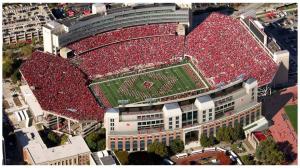If you’re like me, you love watching football.
Whether it’s a Saturday afternoon or evening cheering on your favorite college team, or spending Sundays watching the NFL and trying to figure out if your fantasy team is mopping up against your buddy’s team, there’s nothing like watching football on TV.
OK, there IS one thing better than watching it on TV – being AT the game, for example. Between the tailgating, hanging out with friends and fellow fans, making a ton of noise and cheering the home team on to victory, you can’t beat that experience.
 Being a fan of the University of Nebraska football team, the Husker faithful is proud of the fact that there hasn’t been an empty seat for a Husker home game in more than half a century. Since October of 1962, every game at Memorial Stadium has been a sellout, the seats full of red-clad Husker faithful, cheering Big Red on to victory.
Being a fan of the University of Nebraska football team, the Husker faithful is proud of the fact that there hasn’t been an empty seat for a Husker home game in more than half a century. Since October of 1962, every game at Memorial Stadium has been a sellout, the seats full of red-clad Husker faithful, cheering Big Red on to victory.
With the recent additions to the stadium, the capacity for a Husker home football game now exceeds more than 90,000 people. In fact, 91,585 fans jammed the old yard recently to watch Nebraska take on the University of Miami (Fla.) on national TV.
Can you imagine – more than 91,000 people in one place to watch a football game? Now, ponder this thought – what if every one of those fans was a survivor of sexual assault?
It’s an odd thing to think about, but if you were to take the Centers For Disease Control study that found 1 in 4 girls and 1 in 6 boys are survivors of sexual assault, and applied those ratios to the current K-12 enrollment numbers quoted by the Nebraska Department of Education, you’d have enough to fill up more than two-thirds of Memorial Stadium’s capacity.
Throw in the kids who are between infant and preschool age living in the state – and now you’ve filled it up well past capacity.
That there are THAT many children in this state who are potential survivors (we don’t use the word “victim” within these walls, which I’ll explain in a future post) is a staggering and appalling thought. And these are just the kids we’re talking about in a state with a population of just over 2 million – can you even begin to imagine what the number of children who are survivors – including those who are still going through the experience – could possibly be?
And, as those of us who have been through the experience can attest, this is not something that children simply grow out of. The physical wounds may heal, but the emotional scars and the mental hurdles are there for a long, long time. This isn’t something that just goes away – especially if the survivor’s attacker is a close friend or family member. It’s something that is always there for us to deal with.
HOW we deal with the issue is the important thing. I’ve used just about every tool imaginable, from faith and prayer to alcohol and drugs. I’ve drank massive amounts of alcohol to dull the pain. I’ve smoked, ingested and popped about every kind of drug you can think of at least once. I have talked with more than my share of psychologists, psychiatrists and other “head doctors” about it. I’ve prayed and spoke at length with my Higher Power about the experience.
While the drugs did little more than suspend reality for a temporary period, I’ve found that talking out my issues has been the biggest source of comfort for me. Whether it’s with a therapist, your pastor or a friend with a good ear to chew on, getting it out in the open and talking about it is sometimes the best therapy that’s available.
That’s something that I try to tell people when I speak publicly about my experience. I’ve had the chance to speak to teenagers and college students at a number of venues in my home area in recent months, and it makes my day when one of them comes up to me and thanks me for speaking out. Sometimes, they’ll share some of their story with me. Other times, the look in their eyes and the way they carry themselves as they thank me says all that needs to be said, and I hope that, by speaking out, it gives them the courage to do the same thing and seek the help they deserve to have to help them realize that they, too, are survivors.
One day, I would like to be able to say that the number of survivors of sexual assault wouldn’t be enough to fill up a meeting room at a local coffee shop. Filling a stadium full of Husker football fans is impressive – that you can fill that same stadium with every child in Nebraska who is a survivor of sexual assault isn’t something my state can be very proud of.
